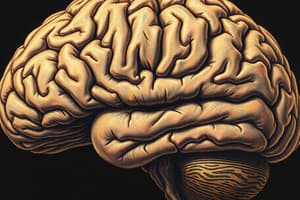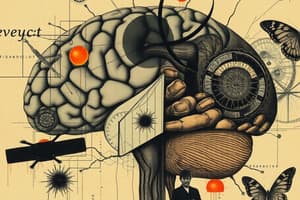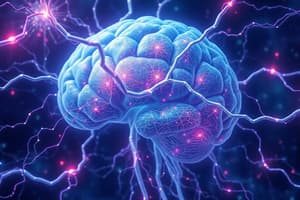Podcast
Questions and Answers
Part of the brain responsible for coordinating muscle movements and maintaining balance:
Part of the brain responsible for coordinating muscle movements and maintaining balance:
- Thalamus
- Cerebrum
- Pons
- Hypothalamus
- Cerebellum (correct)
Pertaining to muscles and nerves:
Pertaining to muscles and nerves:
- Polyneuritis
- Neuronastomosis
- Meningomyelocele
- Myelogram
- Myoneural (correct)
Neurotransmitter:
Neurotransmitter:
- Acetylcholine (correct)
- Sulcus
- Cerebrospinal fluid
- Myelin
- Lymph
Part of the nerve cell that first receives the nervous impulse is the:
Part of the nerve cell that first receives the nervous impulse is the:
Elevated portions of the cerebral cortex are called:
Elevated portions of the cerebral cortex are called:
Burning sensation of pain:
Burning sensation of pain:
A network of interlacing nerve fibers in the peripheral nervous system:
A network of interlacing nerve fibers in the peripheral nervous system:
Portion of the brain that controls the pituitary gland, water balance, and body temperature:
Portion of the brain that controls the pituitary gland, water balance, and body temperature:
Glial cells:
Glial cells:
Space between nerve cells is called the:
Space between nerve cells is called the:
Part of the brain that controls breathing, heartbeat, and the size of blood vessels:
Part of the brain that controls breathing, heartbeat, and the size of blood vessels:
Inability to speak:
Inability to speak:
Collection of spinal nerves below the end of the spinal cord:
Collection of spinal nerves below the end of the spinal cord:
X-ray record of the spinal cord:
X-ray record of the spinal cord:
Collection of blood within the meningeal layers:
Collection of blood within the meningeal layers:
Abnormal sensation of tingling or prickling:
Abnormal sensation of tingling or prickling:
Inflammation of spinal nerve root:
Inflammation of spinal nerve root:
A highly malignant brain tumor:
A highly malignant brain tumor:
Paralysis of four extremities:
Paralysis of four extremities:
Cerebral aneurysm, thrombosis, or hemorrhage can be the cause of:
Cerebral aneurysm, thrombosis, or hemorrhage can be the cause of:
Fainting:
Fainting:
Spina bifida is associated with:
Spina bifida is associated with:
Parkinson disease is characterized by:
Parkinson disease is characterized by:
Disorder of reading, writing, and learning is:
Disorder of reading, writing, and learning is:
Condition of no nervous sensation:
Condition of no nervous sensation:
Study Notes
Brain Functions
- Cerebellum: Coordinates muscle movements and maintains balance.
- Hypothalamus: Regulates the pituitary gland, water balance, and body temperature.
- Medulla Oblongata: Controls breathing, heartbeat, and blood vessel size.
Nervous System Components
- Myoneural: Related to muscles and nerves.
- Neurotransmitter: A chemical messenger, specifically Acetylcholine, that transmits signals across synapses.
- Glial Cells: Supportive cells in the nervous system, particularly Astrocytes.
Neural Structure
- Dendrite: Part of a nerve cell that receives the nervous impulse first.
- Plexus: A network of interlacing nerve fibers in the peripheral nervous system.
- Synapse: The space between nerve cells where communication occurs.
Abnormal Sensations and Disorders
- Causalgia: Burning sensation of pain.
- Dysesthesia: Abnormal sensation of tingling or prickling.
- Aphasia: Inability to speak.
Spinal Cord and Nerves
- Cauda Equina: Collection of spinal nerves below the end of the spinal cord.
- Myelogram: X-ray recording of the spinal cord.
Hematomas and Inflammation
- Subdural Hematoma: A collection of blood within the meningeal layers.
- Radiculitis: Inflammation of the spinal nerve root.
Diseases and Conditions
- Glioblastoma: Highly malignant brain tumor.
- Quadriplegia: Paralysis of all four extremities.
- Cerebrovascular Accident (CVA): Condition resulting from cerebral aneurysm, thrombosis, or hemorrhage.
Other Key Terms
- Syncope: Fainting.
- Meningomyelocele: Condition associated with spina bifida.
- Dyslexia: Disorder impacting reading, writing, and learning abilities.
Studying That Suits You
Use AI to generate personalized quizzes and flashcards to suit your learning preferences.
Description
Test your knowledge of the nervous system with these flashcards from Chapter 10. Each card includes essential terms and their definitions, such as the roles of various brain parts and neurotransmitters. Perfect for students looking to reinforce their understanding of neuroscience.




